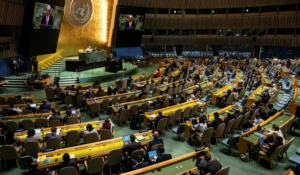UN overwhelmingly adopts resolution to impose sanctions, arms embargo on Israel

António Guterres, UN Secretary-General, speaks during the 79th session of the United Nations General Assembly, 10 September 2024
Reuters, Jonathan Lis and Etan Nechin report in Haaretz on 18 September 2024:
The United Nations General Assembly on Wednesday adopted a Palestinian-drafted resolution that demands Israel end “its unlawful presence in the Occupied Palestinian Territory” within 12 months.
The resolution received 124 votes in favor, while 43 countries abstained and Israel, the United States and 12 others voted no.
The action isolates Israel days before world leaders travel to New York for their annual U.N. gathering. Israeli Prime Minister Benjamin Netanyahu is due to address the 193-member General Assembly on Sept. 26, the same day as Palestinian President Mahmoud Abbas.
The resolution welcomes a July advisory opinion by the International Court of Justice that said Israel’s occupation of Palestinian territories and settlements is illegal and should be withdrawn.
The advisory opinion – by the highest United Nations court, also known as the World Court – said this should be done “as rapidly as possible,” although the General Assembly resolution imposes a 12-month deadline.
The General Assembly resolution also calls on states to “take steps towards ceasing the importation of any products originating in the Israeli settlements, as well as the provision or transfer of arms, munitions and related equipment to Israel … where there are reasonable grounds to suspect that they may be used in the Occupied Palestinian Territory.”
The resolution is the first to be formally put forward by the Palestinian Authority since it gained additional rights and privileges this month including a seat among U.N. members in the assembly hall and the right to propose draft resolutions.
U.S. Ambassador to the U.N. Linda Thomas-Greenfield urged countries to vote no on Wednesday. Washington – an arms supplier to and ally of Israel – has long opposed unilateral measures that undermine the prospect of a two-state solution.
The ICJ advisory opinion is not binding but carries weight under international law and may weaken support for Israel. A General Assembly resolution also is not binding, but carries political weight. There is no veto power in the assembly.
“Each country has a vote, and the world is watching us,” Palestinian U.N. Ambassador Riyad Mansour told the General Assembly on Tuesday. “Please stand on the right side of history. With international law. With freedom. With peace.”
Israel’s U.N. Ambassador Danny Danon criticized the General Assembly on Tuesday for failing to condemn the Oct. 7 attack on Israel by Palestinian Hamas militants that sparked Israel’s assault on the Hamas-run Gaza Strip. He rejected the Palestinian text, saying: “Let’s call this for what it is: this resolution is diplomatic terrorism, using the tools of diplomacy not to build bridges but to destroy them.”
The General Assembly on Oct. 27 last year called for an immediate humanitarian truce in Gaza with 120 votes in favor. Then in December, 153 countries voted to demand – instead of calling for – an immediate humanitarian ceasefire in December.
The Palestinian Authority represents the Palestinian people at the U.N., where it is a non-member observer state and the delegation is known as the State of Palestine.
Israel’s Foreign Ministry spokesperson, Oren Marmorstein, reacted to the resolution on X, calling the General Assembly “political theatre,” and said they made a “distorted decision that is disconnected from reality, encourages terrorism and harms the chances for peace.”
“Israel rejects the distorted and disconnected from reality decision of the General Assembly and thanks the leading countries that did not join the march of folly that took place today in New York,” he wrote.
Speaking to reporters ahead of the General Assembly, Danon said Israel will distinguish between UN agencies that cooperate with Israel, like the World Health Organization and UNICEF, citing the polio vaccine drive, and those adversarial, like UNRWA. He stated he is open to dialogue but will not engage with actors who are hostile to Israel.
On Lebanon, Danon said Israel wants a diplomatic solution, but war seems unavoidable. Addressing the escalation in the north, he said that while Israel has no desire for an all-out war, the options are either for Hezbollah to retreat voluntarily through an agreement or to risk a full war. He urged the international community to pressure Lebanon to rein in Hezbollah. “In our region, you have to show strength,” he said, adding that Israel is shifting its focus to the northern front.
Regarding the escalation in the West Bank, Danon blamed Iran for opening a third front against Israel, with Israel carrying out “preemptive strikes” on factions within the West Bank.
As for the timeline for the Gaza war, Danon said that while there is no specific timeline, Israel does not see Hamas’ capabilities as what they were on October 7. He emphasized Israel’s important goal of capturing Yahya Sinwar, comparing it to the U.S. operation to get Bin Laden, but saying, “it won’t take us as long.”
He said “we have no desire to stay in Gaza but we are going to keep our freedom to maneuver” it is deemed necessary. He’s calling for a rebuilding of Gaza “after victory” with willing actors. He said that before October 7 there was steps towards a peace agreement with Saudi Arabia that were halted because of the war but it’s in both countries’ interest to move forward towards that goal.
On Russia-Israel relations, Danon said that while Israel still has the same ambassador as when he was last at the UN, “it is not the same Russia.” He noted that Russia’s view of Iran as a “major strategic partner” is not a good sign.
When asked about Iranian gestures towards the U.S. regarding a nuclear agreement, Danon responded that only crippling sanctions are the way to go, and if not, “the international community needs to consider a military option.”
This article is reproduced in its entirety
